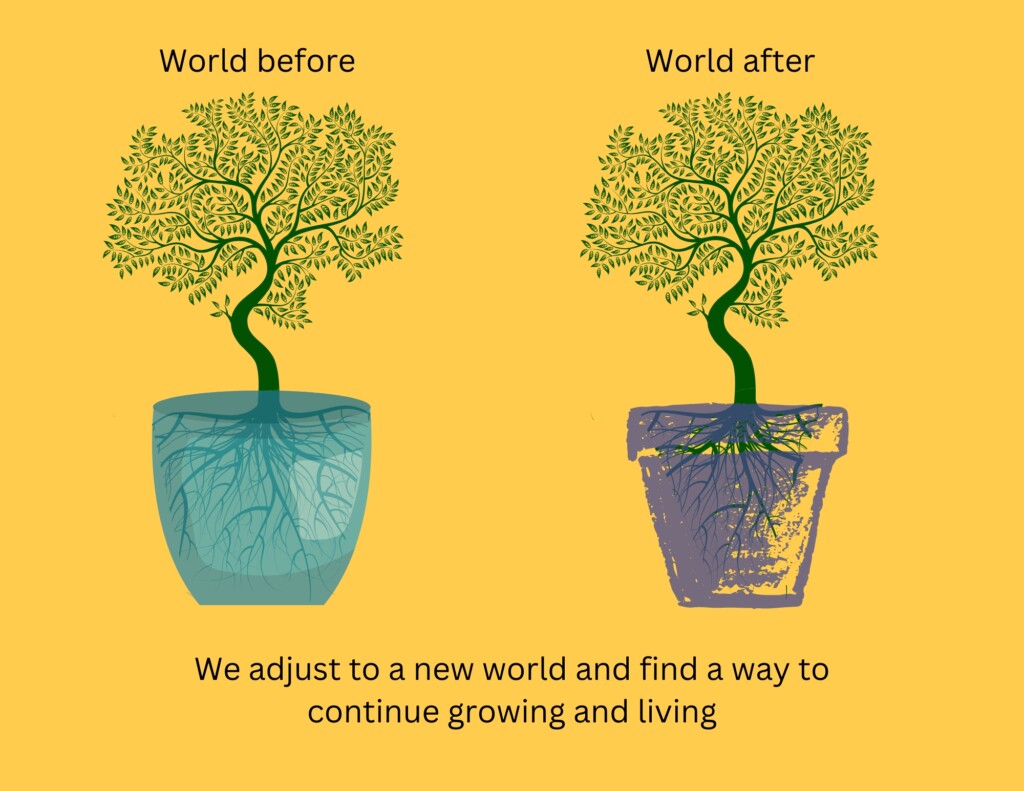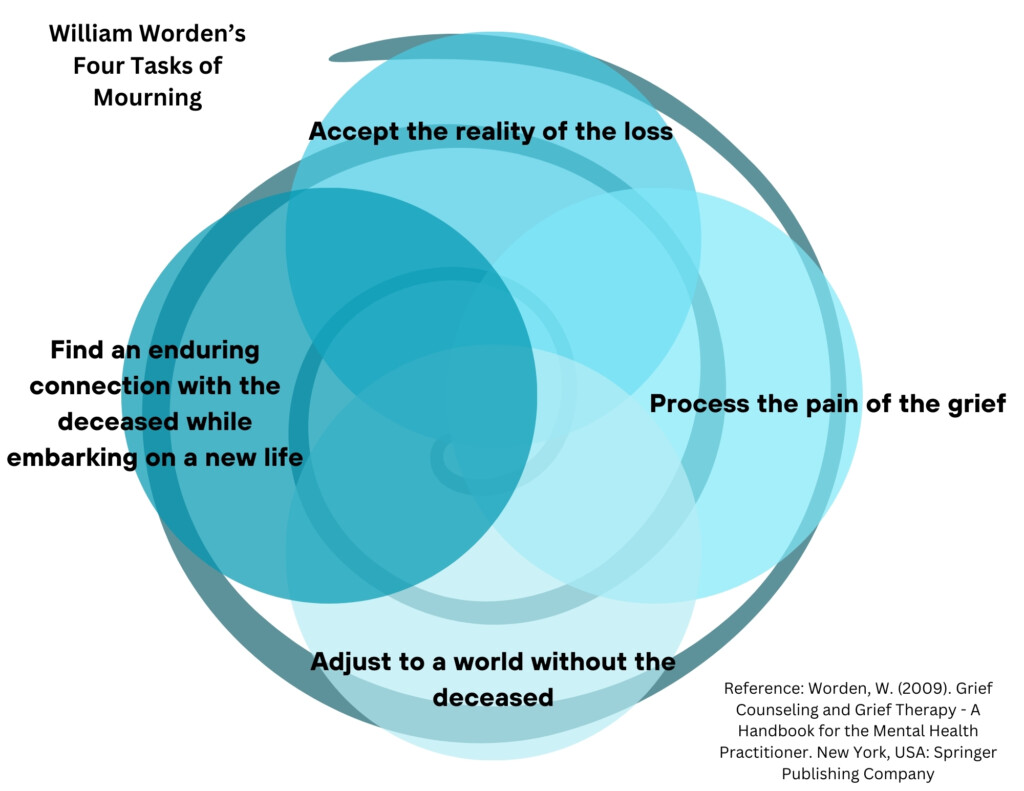Loss and Grief: Experienced By All, Discussed by Few
I love discussing loss and grief. Yes, you read that right; I get excited to discuss two topics that most people avoid. The other night I had the privilege of leading a discussion among peer specialists about providing support for someone experiencing loss and grief and it was amazing. The reason I love discussing this topic so much is because of the incredible, positive impact you can have on someone if you can be present with them during their loss and grief journey. Many feel so alone in grief, but it doesn’t have to be that way. It shouldn’t be that way. Despite the fact that every human encounters these experiences, we, as a collective group, struggle to be supportive and understand what’s occurring. What follows is information meant to help raise awareness of the realities of loss and grief. There are various areas of thought on these topics, and what’s discussed below is not all inclusive and is heavily biased from my education and work in the field*. I’ve also included insights from some of the peers who participated in the discussion the other day. Hopefully this will spark a pursuit of further learning within you to strengthen your ability to support others through loss and grief.
*I am a licensed professional counselor in Pennsylvania. During her time providing direct care, I specialized in grief and loss.
Loss
- Loss of certain dreams when you can’t continue school
- Loss of childhood innocence for the child who witnesses violence, hears gunshots, experiences the pains of hunger
- Loss of rights and/or freedom for the person who is convicted of a crime, even if they’ve served their “punishment”
- Loss of physical ability due to injury, illness, etc.
As Peer Specialist Talynn Smykle- feeling a loss of control encompasses everything that happens when you experience a loss. Losing something or someone can make us feel out of control and lead us to try and regain control, even if it isn’t the healthiest choice or best thing to do in the long-run. The sense of being out of control of our life, our world, can be extremely scary and should be recognized as a potential contributor to the grief experienced.
Whenever there's a loss, in any way, shape, or form, it can touch your life in so many different ways that you didn't even think were important until it actually happens.
Marti Blose, Certified Peeer Counselor
Grief
Grief is the emotional, physical, cognitive, and behavioral responses to loss; the experience of the loss. Even though it is a universal experience, grief is unique to each individual and how is presents can vary by loss, nature of the relationship, coping skills, previous experiences with grief, and so many more variables. For example, identical twin sisters could both experience the death of their father and have two completely different grief experiences. Because of how individualized grief is, it’s important that, when offering support to someone grieving, we never push what works for us or what we think is “best.”
“Normal” (Uncomplicated) Grief
The “typical” emotional, cognitive, and physical reactions following a loss. A relatively predictable pattern of acute distress that gradually lessons over time. This can include feelings of sadness, anger, guilt, anxiety, yearning, sleep interruptions, and appetite changes. The person gradually adapts to the loss and begins adjusting to their new life.
Complicated Grief
An extended grieving period that interferes with the person’s ability to function in daily life. There is difficulty or an inability to accept and adjust to the loss. The feelings described for “normal” grief are experienced at a greater extent – debilitating sadness, feelings of emptiness or meaninglessness, inability to engage in happy memories and stories.
Anticipatory Grief
Grief experienced before an impending loss. Mourning begins prior to the loss of someone or something. These feelings can include fear, anxiety, sadness, and a feeling of dread. This may help with the grief experience after the loss, and it may not. You may have heard someone say “it’s easier because they knew it was coming.” A loss is a loss, regardless of advanced notice or sudden occurrence. Anticipatory grief can itself be complicated and deserves as much support as post-loss grief experiences.
Disenfranchised Grief
When grief is not acknowledged or socially supported because of the nature of the loss or relationship. Examples include:
- Death by suicide due to the stigma associated with stigma
- Death of a former romantic partner
- Incarceration of a loved one
- Infertility
Individuals may feel like they have to hide their grief or that their grief isn’t valid. This can lead to increased feelings of isolation and sadness. Because of the lack of social support and recognition of the loss/grief, healing can be challenging. Acknowledging and respecting the loss/grief is essential when providing support.
A loss of life is a loss of life. This is a human life we're talking about.
Roger Crouell, Certified Recovery Specialist Tweet
Stages and Tasks
Stages of Grief
Many people have heard of Elizabeth Kubler-Ross’ theory of the five stages of grief. While significant, it’s important to understand that Kubler-Ross’ work was studying the experience of individuals dying and their grief experience, not the grief experience of those mourning the death. For that reason and others, this article will not be discussing the stages of grief. However, if it is a theory that helps you or someone you are supporting in navigating their grief, then embrace it and use what works for you/them. David Kessler, who studied under Kubler-Ross, has expanded upon her work in his book, Finding Meaning: The Sixth Stage of Grief. Marti described this book is extremely impactful and beneficial, so I take that as a great recommendation. To learn more about the stages of grief, you can visit grief.com.
Tasks of Mourning
I personally prefer William Worden’s Four Tasks of Mourning, as it is less linear, more culturally inclusive, and places the person grieving as more active in their grief rather than passively having grief happen to them. Unfortunately, there isn’t a verified source of Worden’s work online, but a helpful resource can be found here. It’s important to understand the tasks are not linear, although they are numbered. Instead, a person can revisit tasks, experience multiple at the same time, and have the tasks recur in the future. I personally prefer this model because it better reflect the fluidity of grief and how, in many ways, it is a life-long process and experience. While Worden’s tasks were specifically for grief following a death, they can be applied to any type of loss. The following information is all based on Worden’s book, Grief Counseling and Grief Therapy.
Task 1: Accept the reality of the loss
The person comes to a place of recognizing the permanency of the loss. Difficulty with this task can look like denial, disbelief, magical thinking, etc. (complicated grief).
Task 2: Process the pain of the grief
Perhaps the component of grief that makes others the most uncomfortable. We cannot ignore the pain, the emotions, the thoughts. The harder we try to ignore them, the stronger and more overwhelming they will be whenever they get their chance to break through. Sitting, not speaking, not trying to “fix” anything, just sitting with a person in their grief can be the most significant act of support we can offer. Many supporters may believe that talking about the loss will be more painful. In reality, the person is going to be thinking about the loss regardless of you bringing it up, what you can offer them is a safe and supportive space to have those thoughts, recall those memories, laugh about jokes, etc.
Task 3: Adjust to a world without the deceased
We see a timeline set on grief through a predetermined allotment of bereavement days. In reality, grief is, in many ways, truly kicking in when the rest of the world “moves on.” Dependent on the loss, there can be a significant impact on the day-to-day of the person. A new way of existing in the new world, a world without the person or thing that was lost, must be developed. Difficulty in this process can appear as someone who isolates to the extent of not leaving their house, never returning to work, demonstrating poor hygiene, etc. (complicated grief). Marti Blose, Certified Peer Counselor, perhaps said it best, “grief and loss necessitates the word change and we don’t like change very much. we really hold on to the things we can. and when loss is experienced, that always in some way necessitates change.”
Task 4: Find an enduring connection with the deceased while embarking on a new life
The loss of someone or something does not erase the relationship or the meaning of the entity in a person’s life. That person or thing still holds meaning, it will just be in a different form after the loss. This can look like a nonprofit being started to address a loved one’s cause of death, or a commitment to take certain actions moving forward. The form of the connection doesn’t matter, what matters is that the person feels the connection.

Receive support for your grief/loss
The following peers were either mentioned above or are peers who offer grief support.







Pingback: